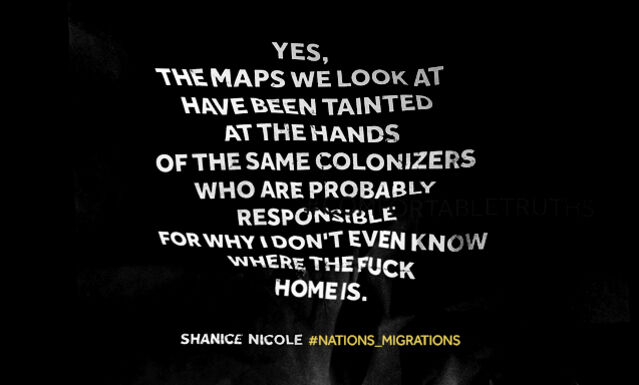
The following poem « My Body Was Not Built For This Cold » was written by Shanice Nicole. In this poem, Shanice deconstructs the comfortable truth* that the act of migrating ensures comfort. Check out her poem and her reflections on the piece below. Click this link to hear Shanice reading the poem!
Shanice Nicole is a Black feminist educator, facilitator, writer, and spoken word artist living and loving in Montreal. She discovered poetry in the summer of 2015 and now uses it as a form of expression, healing and resistance in her fight for social justice. You can follow her work on instagram here: https://www.instagram.com/thatswhatshasaid/
//
On the surface, My Body Was Not Built For This Cold is about my disdain for the cold weather but underneath, it is about my discomfort with the power of whiteness. It is about how whiteness and the ice cold violence it creates impacts our bodies and and our lives without our consent. So many of us do not know who we are or where we come from or if the answers to those questions even exist anymore. But it is because of who we are and where we come from, that we will always continue to search and to fight and to survive while bringing a little colour and warmth everywhere we exist.
My Body Was Not Built For This Cold
My body was not built for this cold –
this cold that burrows into my bones
and settles into my soul,
this cold that turns my limbs into ice
and covers everything in white
everything is white.
And this Black body is used to being covered in colour;
this Black body is used to summer;
this Black body is used to the warm.
The warm is her norm
and this cold climate forces her to conform
and also forces her to remember
that even if she learns to survive the ice
it will never suffice
because this body was not built for this cold.My hair and skin scream out from within my body
begging for love and care
to fight back against winter’s despair –
winter’s destruction,
where everything dries and dies
and hopes to come back to life next season
when the sun is high in the sky
and its rays penetrate
make way to melt the white
until all we see is colour again.
No, my body was not built for this cold.But this cold is what my body has known.
This cold is where my body has grown.
Yet how is it that every year it returns
and my bones still say no?
And the rest of my body follows
as if to her this cold is also unknown.
How, when this is home?
Is this home?
Would I even know?If I was looking at a map
– an untouched one at that –
yes, the maps we look at
have been tainted at the hands of the same colonizers
who are probably responsible for why I don’t even know
where the fuck home is.
So would I even know?
No, I don’t know
but what I do know
is that no, my body was not built for this cold.I know because I dream of islands I have never seen,
lands I have never walked on
and waters I have never swam in.
I know because I dream of foods I have never eaten
and languages I have never speaken.
And if me saying speaken instead of spoken
arouses some commotion inside of your body
due to my grammatical error,
ask yourself whose language it is
that we work so hard to perfect
while the dialects of our ancestors
have never rolled off our tongues –
the colonizer is one and the same.So as I was saying, I dream.
I dream of what home could be.
They say body memory is a thing
and I believe that it must be
the blood of my ancestors inside of my veins
reminding me of what it’s like to feel at home,
to not feel cold,
to feel the heat from the sun
warm up my lungs
until I breathe rays of sunshine.
I may not know home when I see it
but I will know when I feel it.
I will know,
because my body was built for the reunion.
* #ComfortableTruths are mainstream attitudes and ideas about nationhood, belonging and identity that, despite not being true (such as « immigrants have it easy in Canada »), have become so engrained in the Canadian imaginary and mainstream culture that they become orthodoxy. As part of Cinema Politica’s Nations & Migrations project, we reached out to activists and artists across the country and asked them to share their thoughts and reactions to these so-called truths.




